

Young people's recommendations for GCSE maths and English. Making the most of the Maths and English entry assessment materials. Entry assessments for Mathematics (Numeracy) Teacher Training. Pre-course initial assessment: Developing the personal maths skills of teachers and assessors - Skip to main content Developing the personal maths skills of teachers and assessors - Pre-course initial assessment Summary This document is the pre-course initial assessment for the Level 3 award in mathematics for numeracy teaching - Module 7: Developing the personal maths skills of teachers and assessors.
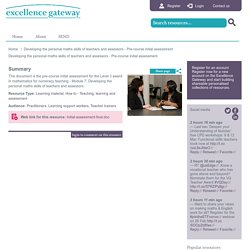
Resource Type: Learning material, How to - Teaching, learning and assessment Audience: Practitioners, Learning support workers, Teacher trainers Web link for this resource: Initial-assessment-final.doc Register for an account Register now for a new account on the Excellence Gateway and start building shareable personalised collections of resources. Social media. Self-evaluation - Career-long Professional Learning - Professional learning. Having highly-skilled, committed and motivated teachers is to the benefit of all our children and young people by improving their learning experiences.
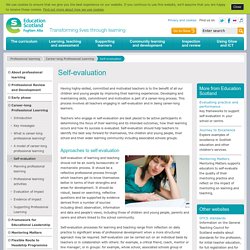
Developing and maintaining skills, commitment and motivation is part of a career-long process. This process involves all teachers engaging in self-evaluation and in being career-long learners. Teachers who engage in self-evaluation are best placed to be active participants in determining the focus of their learning and its intended outcomes, how their learning occurs and how its success is evaluated. Self-evaluation should help teachers to identify the best way forward for themselves, the children and young people, their school and their wider learning community including associated schools groups. Teachers' standards. Math Hombre: Self-Assessment for Teachers. Merry Christmas to all!
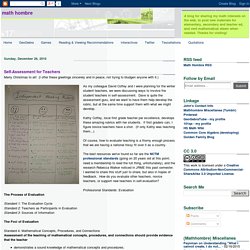
(I offer these greetings sincerely and in peace, not trying to bludgen anyone with it.) As my colleague David Coffey and I were planning for the winter student teachers, we were discussing ways to involve the student teachers in self-assessment. Dave is quite the assessment guru, and we want to have them help develop the rubric, but at the same time support them with what we might develop. Kathy Coffey, local first grade teacher par excellence, develops these amazing rubrics with her students.
If first graders can, I figure novice teachers have a shot. Of course, how to evaluate teaching is a thorny enough process that we are having a national hissy fit over it as a country. The best resources we've found so far are the NCTM professional standards (going on 20 years old at this point; need a membership to read the full thing, unfortunately), and the research Rebecca Walker noticed in JRME this past semester. LearningJournal2. Self Assessment - Geoff PettyGeoff Petty. Think of something you are good at, and I bet you learned it by self-assessment.
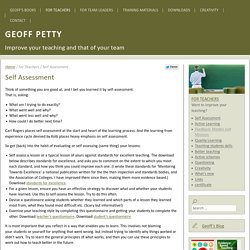
That is, asking: What am I trying to do exactly? What went well and why? What went less well and why? How could I do better next time? Carl Rogers places self assessment at the start and heart of the learning process. So get (back) into the habit of evaluating or self assessing (same thing) your lessons: 4991-Prof-standards-A4_4-2.pdf. Professional Standards Animation with subtitles. Working mathematically - OpenLearn - Open University - ME620_1. In this unit you will explore a number of major issues in mathematics education.
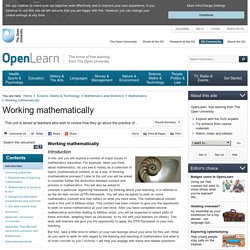
For example, when you think about mathematics, do you see it mainly as a collection of topics (mathematical content) or as a way of thinking (mathematical process)? Later in the unit you will be asked to consider further the distinction between content and process in mathematics. You will also be asked to consider a particular organising framework for thinking about your teaching. It is referred to as the do–talk–record (DTR) framework. You will also be asked to work on some mathematics yourself and then reflect on what you have done.
But first, take a little time to reflect on your own feelings about your aims for this unit. Activity 1 Hopes and fears In your notebook, complete the following sentences. I expect this unit to include work on …I personally would like to work on …An anxiety that I have about the unit is … Comment. My Professional Learning. Self-evaluation Tools. SKE bis 14 677 further education initial teacher training mathematics subject knowledge enhancement ske programme guide. 05 SKE for ETPs Details Final. 03 Lesson Study. 04 Core Maths Masters.